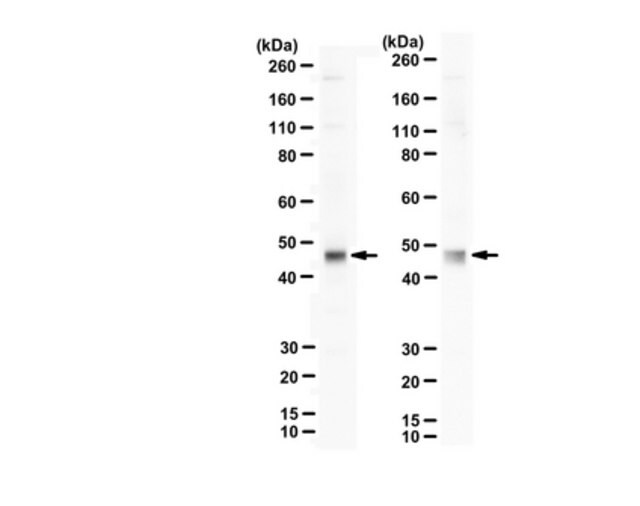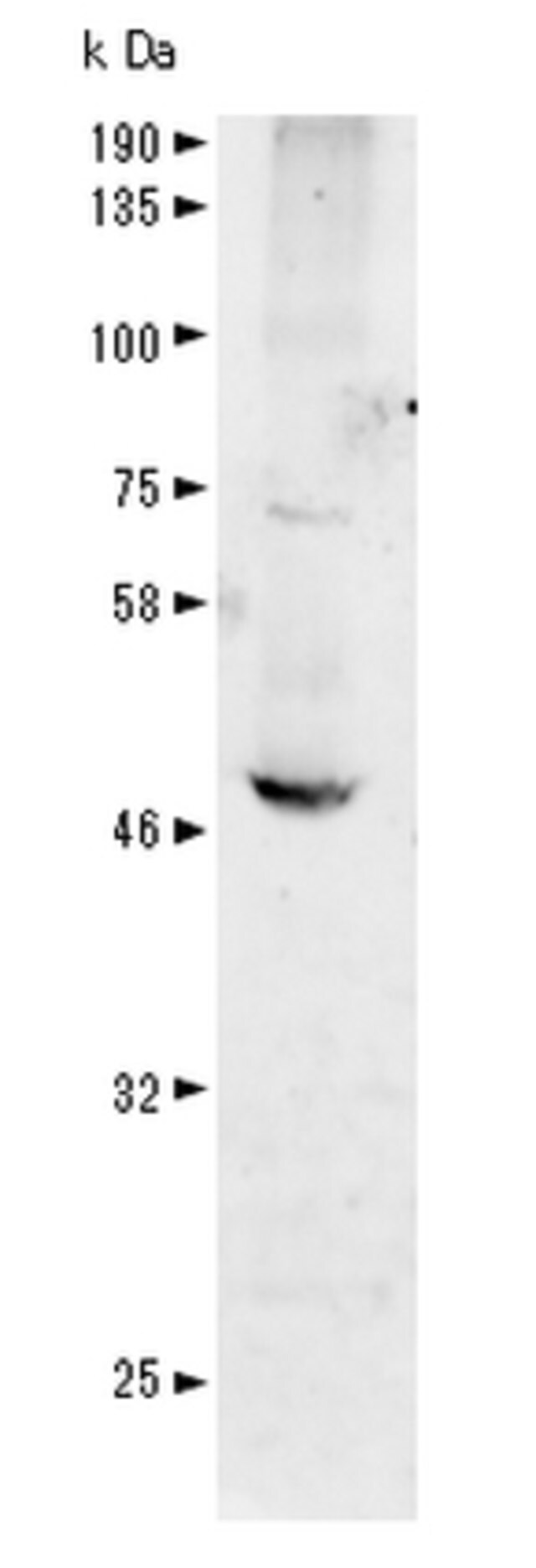您的位置:首页 > 产品中心 > Anti-Vaccinia related kinase-1 Antibody, N-Terminus
Anti-Vaccinia related kinase-1 Antibody, N-Terminus

产品别名
Anti-Vaccinia related kinase-1 Antibody, N-Terminus
Serine/threonine-protein kinase VRK1, EC: 2.7.11.1, Vaccinia-related kinase 1
基本信息
| eCl@ss | 32160702 |
| NACRES | NA.41 |
| General description【一般描述】 | Serine/threonine-protein kinase VRK1 (UniProt: Q99986; also known as EC: 2.7.11.1, Vaccinia-related kinase 1) is encoded by the VRK1 gene (Gene ID: 7443) in human. VRK1 is a serine/threonine kinase that is widely expressed with high expression in fetal liver, testis and thymus. Its protein kinase domain is located in the amino acids 37-317. VRK1 is involved in Golgi disassembly during the cell cycle and Golgi fragmentation. VRK1 phosphorylation by PLK3, which leads to induction of Golgi fragmentation. VRK1 acts by mediating phosphorylation of downstream target protein and is shown to phosphorylate threonine 18 of p53/TP53 and thereby prevent the interaction between p53/TP53 and MDM2. VRK1 is autophosphorylated at various serine and threonine residues, however, it does not impair its ability to phosphorylate p53/TP53. VRK1 is also shown to phosphorylate casein, histone H3, and ATF2, which activates its transcriptional activity. In cancer cell lines VRK1 is reported to phosphorylate histone H2A at threonine 120 that results in inappropriate gene expression, including up-regulation of cyclin D1, which can promote oncogenic transformations. Mutations in VRK1 gene have been linked to Pontocerebellar hypoplasia 1A, a condition characterized by an abnormally small cerebellum and brainstem, central and peripheral motor dysfunction from birth. (Ref.: Aihara, H., et al., (2016). Mol. Cell 64(1); 176-188). |
| Specificity【特异性】 | This rabbit polyclonal antibody detects Serine/threonine-protein kinase VRK1 in human cells. It targets an epitope within 30 amino acids from the N-terminal region. |
| Immunogen【免疫原】 | Epitope: N-terminus KLH-conjugated linear peptide corresponding to 30 amino acids from the N-terminal region of human Vaccinia-related kinase 1 (VRK1). |
| Application【应用】 | Western Blotting Analysis: 1 µg/mL from a representative lot detected Vaccinia related kinase-1, N-Terminus in HT1080 cell lysate. Western Blotting Analysis: 1:50 diluton from a representative lot detected vaccinia related kinase-1, N-Terminus in HeLa cell lysate (Courtesy of Dr. Ito Takashi at Nagasaki University). Western Blotting Analysis: A representative lot detected Vaccinia related kinase-1, N-Terminus in HT1080 cell lysate (Aihara, H., et. al. (2016). Mol Cell. 64(1):176-188). Enzyme Immunoassay Analysis: A representative lot detected Vaccinia related kinase-1, N-Terminus in ELISA application (Aihara, H., et. al. (2016). Mol Cell. 64(1):176-188). Anti-vaccinia related kinase-1, N-Terminus, Cat. No. ABS2113, is a rabbit polyclonal antibody that detects Serine/threonine-protein kinase VRK1 (vaccinia related kinase 1) and has been tested for use in ELISA, and Western Blotting. Research Category Signaling |
| Quality【质量】 | Evaluated by Western Blotting in HeLa cell lysate. Western Blotting Analysis: 1 µg/mL of this antibody detected vaccinia related kinase 1, N-Terminus in HeLa cell lysate. |
| Physical form【外形】 | Format: Purified Purified rabbit polyclonal antibody in buffer containing 50 mM KCl, 25 mM HEPES (pH 7.6), 10% glycerol, 0.1 mM EDTA, 0.01% NP40 with 0.05% sodium azide. Affinity Purified |
| Other Notes【其他说明】 | Concentration: Please refer to lot specific datasheet. |
产品性质
| biological source【生物来源】 | rabbit |
| antibody form【抗体形式】 | affinity isolated antibody |
| antibody product type | primary antibodies |
| clone【克隆】 | polyclonal |
| species reactivity | human |
| packaging【包装】 | antibody small pack of 25 μg |
| technique(s) | ELISA: suitable western blot: suitable |
| isotype【同位素/亚型】 | IgG |
| NCBI accession no.【NCBI登记号】 | NP_003375 |
| UniProt accession no.【UniProt登记号】 | Q99986 |
产品说明
| Target description【目标描述】 | ~ 47 kDa observed; 45.48 kDa calculated. Uncharacterized bands may be observed in some lysate(s). |
| Storage and Stability【储存及稳定性】 | Stable for 1 year at -20°C from date of receipt. Handling Recommendations: Upon receipt and prior to removing the cap, centrifuge the vial and gently mix the solution. Aliquot into microcentrifuge tubes and store at -20°C. Avoid repeated freeze/thaw cycles, which may damage IgG and affect product performance. |
| Disclaimer【免责声明】 | Unless otherwise stated in our catalog or other company documentation accompanying the product(s), our products are intended for research use only and are not to be used for any other purpose, which includes but is not limited to, unauthorized commercial uses, in vitro diagnostic uses, ex vivo or in vivo therapeutic uses or any type of consumption or application to humans or animals. |





